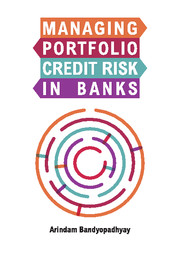Book contents
- Frontmatter
- Dedication
- Contents
- Tables, Figures, Charts
- Preface
- Acknowledgements
- Abbreviations
- 1 Introduction to Credit Risk
- 2 Credit Rating Models
- 3 Approaches for Measuring Probability of Default (PD)
- 4 Exposure at Default (EAD) and Loss Given Default (LGD)
- 5 Validation and Stress Testing of Credit Risk Models
- 6 Portfolio Assessment of Credit Risk: Default Correlation, Asset Correlation and Loss Estimation
- 7 Economic Capital and RAROC
- 8 Basel II IRB Approach of Measuring Credit Risk Regulatory Capital
- Index
1 - Introduction to Credit Risk
Published online by Cambridge University Press: 05 May 2016
- Frontmatter
- Dedication
- Contents
- Tables, Figures, Charts
- Preface
- Acknowledgements
- Abbreviations
- 1 Introduction to Credit Risk
- 2 Credit Rating Models
- 3 Approaches for Measuring Probability of Default (PD)
- 4 Exposure at Default (EAD) and Loss Given Default (LGD)
- 5 Validation and Stress Testing of Credit Risk Models
- 6 Portfolio Assessment of Credit Risk: Default Correlation, Asset Correlation and Loss Estimation
- 7 Economic Capital and RAROC
- 8 Basel II IRB Approach of Measuring Credit Risk Regulatory Capital
- Index
Summary
Credit risk is the potential that a bank borrower or a group of borrowers will fail to meet its contractual obligations and the future loss associated with that. For most banks, loans are the largest and most obvious source of credit risk. However, other sources of credit risk exist throughout the activities of a bank, including the banking book and trading book, and both on and off the balance sheet. Banks are also increasingly facing credit risk in various financial instruments other than loans, including acceptances, interbank transactions, trade financing, foreign exchange transactions, financial futures, swaps, bonds, equities and options, in the extension of commitments and guarantees, and the settlement of transactions. Since the exposure to credit risk continues to be the leading source of problems in banks worldwide, banks and their supervisors should be able to draw useful lessons from the experiences. Banks should now have a keen awareness of the need to identify, measure, monitor and control credit risk as well as to determine that they hold adequate capital against these risks and that they are adequately compensated for risks incurred.
By definition, credit risk is the risk resulting from uncertainty in counterparty's ability or willingness to meet its contractual obligations. Credit risk relates to the possibility that loans will not be paid or that investments will deteriorate in quality or go into default with consequent loss to the bank. If credit can be defined as “nothing but the expectation of a sum of money within some limited time,” then credit risk is the possibility that this expectation will not be fulfilled. Credit risk exists as long as banks lend money. Credit risk is not confined to the risk that borrowers are unable to pay; it also includes the risk of payments being delayed, which can also cause problems for the bank. The default of a small number of large exposures or cluster defaults in an important loan segment (e.g. housing loans, etc.) could generate very large losses and in the extreme case, could lead to a bank becoming insolvent. As a result of these risks, bankers must conduct proper evaluation of default risks associated with the borrowers.
- Type
- Chapter
- Information
- Managing Portfolio Credit Risk in Banks , pp. 1 - 23Publisher: Cambridge University PressPrint publication year: 2016



